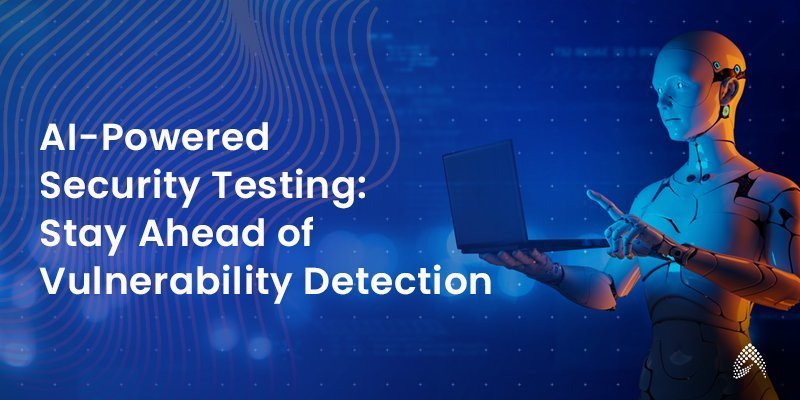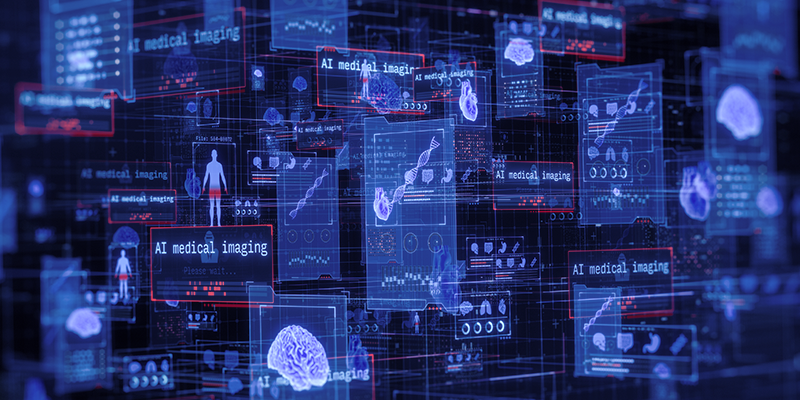AI In Security Testing: Stay Ahead of Vulnerability Detection

In today’s fast-evolving digital landscape, cybersecurity threats have become more sophisticated, persistent, and destructive. Cybercriminals are employing advanced tactics to breach systems, disrupt services, and steal sensitive data. For businesses, the stakes have never been higher. As organizations scale their digital presence, securing their infrastructure becomes paramount.
Traditionally, security testing involved human-driven processes, such as manual penetration testing and vulnerability scanning, which were effective but time-consuming and often unable to keep up with emerging threats. This is where AI in security testing comes into play. The integration of AI-powered security testing tools is not just a technological innovation—it’s a game-changer, providing organizations with faster, more accurate, and more proactive defense mechanisms.
This article delves into how AI is transforming security testing, the benefits it brings, and why businesses should integrate AI-driven solutions into their security strategies.
According to a report from the University of Maryland – there is a new attack somewhere on the web every 39 seconds, amounting to over 2,200 cyber attacks daily!
The Growing Need for AI in Security Testing
With the digital transformation of businesses across industries, the complexity and volume of cyber threats have increased exponentially. Hackers now employ AI to automate attacks, making it even harder for traditional security measures to keep up. As the cost of data breaches continues to rise, organizations are looking for solutions that can detect vulnerabilities faster and more effectively.
AI in security testing addresses this challenge by enabling continuous, real-time monitoring and analysis of security systems. By automating routine tasks and providing intelligent threat detection, AI-driven security tools can uncover vulnerabilities that traditional methods often miss.
Moreover, with the increasing adoption of cloud technologies, IoT devices, and mobile apps, the attack surface has expanded, requiring security systems to be more agile and adaptive. AI-powered security testing solutions are designed to tackle these challenges with precision and scalability, offering businesses a robust defense against the ever-evolving cyber threat landscape.
This is where Artificial Intelligence comes into play by offering faster, more efficient, and more accurate testing methods. AI-powered software testing methods are ideal for gathering intel on vulnerabilities being identified daily, using this data to refine testing methodologies, and then using the new methodologies for performing automated testing.
How AI Enhances Security Testing
AI is revolutionizing security testing in several ways, each more impactful than the last. Here’s how AI is enhancing security testing:
1. Automating Vulnerability Scanning
One of the most time-consuming aspects of traditional security testing is vulnerability scanning. AI-powered tools can automate this process, rapidly scanning applications and networks for potential vulnerabilities. By leveraging machine learning algorithms, these tools can identify weaknesses in code, configuration flaws, or even gaps in security policies with much greater speed and accuracy than manual testing.
AI tools don’t just identify known vulnerabilities—they can also predict new, previously unseen threats by learning from historical data and security patterns. This predictive capability is crucial for staying one step ahead of cybercriminals.
2. Behavioral Analysis for Threat Detection
AI’s ability to learn and adapt makes it particularly useful in detecting abnormal behavior within systems. AI-powered security testing tools use machine learning to analyze user behavior, network traffic, and system interactions. These systems can then flag anything that deviates from established patterns, indicating potential security breaches or cyberattacks in real-time.
By continuously learning from ongoing activities, AI can even detect zero-day vulnerabilities (attacks that exploit vulnerabilities before they are known to the software vendor) and other advanced threats that might go unnoticed by traditional security measures.
3. Real-time Threat Intelligence
AI integrates seamlessly with real-time threat intelligence feeds, helping businesses stay updated on emerging threats. By processing vast amounts of data from global security networks, AI systems can analyze threat data, correlate it, and respond to attacks faster than human-driven systems could. These systems can also automatically update security protocols and defenses based on the latest threat intelligence, ensuring the system is always prepared for the newest forms of cyberattacks.
Use cases of AI in security testing:

1. Hacker behavior and pattern analysis
Hackers are always ahead of your team and continuously try to invade. In such cases, it is difficult to understand how a real attacker would behave. With AI in place, you can train AI/ML to identify and exploit vulnerabilities in software systems, which can help security testers understand how an attacker would behave in real-time. This will help you and your team to stay ahead and confront vulnerabilities.
2. Discovering new vulnerabilities
Automated security testing has a limitation when it comes to detecting new vulnerabilities. However, AI has the ability to assist in the discovery of previously unknown vulnerabilities. By mimicking human interactions, AI can effectively uncover new vulnerabilities and improve overall efficiency.
3. Continuously updating test case scenarios based on new vulnerabilities
AI-powered security testing involves machine learning and threat intelligence. Whenever new security risks arise, AI algorithms examine the most current data to detect patterns and characteristics of these vulnerabilities. AI then produces, examines, and adjusts test cases to address these particular vulnerabilities, ensuring that the testing procedure keeps up with the constantly evolving threat environment.
This proactive approach allows organizations to stay ahead of potential security risks and enhance their testing effectiveness.
AI-powered security testing benefits:
AI-based security solutions not only crack complex problems but also contribute to solving human resources issues in SecOps environments, application development, and security testing.
Here are some benefits you can achieve with AI-powered security testing.
- AI-powered algorithms can analyze vast amounts of security data and user behavior, learn from patterns, and prioritize real security vulnerabilities accurately, improving accuracy. Based on “normal” system behavior, we can confidently identify dangerous patterns. Supervised or unsupervised ML-powered solutions can detect patterns associated with different threats in huge volumes of data.
- AI can analyze your application’s unique characteristics, business logic, and user behavior. This allows AI-powered tools to provide more targeted and customized security testing that traditional approaches miss.
- AI can seamlessly integrate with Agile and DevOps methodologies, ensuring continuous and rapid testing feedback. AI-powered security testing enables early identification and resolution of vulnerabilities.
- AI tools can leverage deep learning techniques and threat intelligence feeds to enhance automated security testing. With this, you can proactively secure applications by prioritizing areas of higher risk.
AI-powered security testing tools:
With some hands-on experience and considering the market demands, we can say Testim, Functionize, and Mabi are good tools to ensure application security.
How to Overcome the Challenges of AI in Security Testing
While AI has transformative potential, its application in security testing is not without challenges. Some of the key hurdles include:
Data Privacy Concerns: Security testing tools must adhere to strict privacy regulations, especially when dealing with sensitive customer data. AI tools must be designed to ensure compliance with privacy laws such as GDPR and HIPAA.
Implementation Costs: While AI offers significant ROI, the initial implementation and training costs can be high. However, these costs can be mitigated by working with experienced AI consultants who specialize in security.
Bias in Machine Learning: If AI tools are trained on biased data, they may overlook specific vulnerabilities or patterns. Ensuring that training data is representative and comprehensive is key to mitigating this risk.
Despite these challenges, the benefits of AI in security testing far outweigh the potential drawbacks, especially when deployed correctly.
Conclusion:
Every business and customer is concerned about security. But resolving flaws that occur every 39 seconds is a difficult task to achieve. AI-powered security testing is a great way to enhance security and improve confidence by 50 – 60% amidst ever-evolving security threats. With AI-powered security testing, developers and security teams have a powerful tool that can significantly improve the security of their applications.
However, it’s up to us to harness the power of AI. So, it’s time to collaborate and share perspectives on how AI impacts businesses and application security. Get in touch with Amzur for custom AI solutions in application testing.
Unlock the power of AI and bring the next-gen tech now to your business. Stay informed and secure with modern AI solutions.

Head of Quality Engineering



